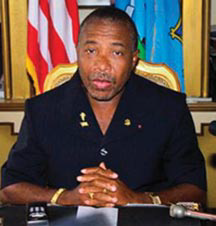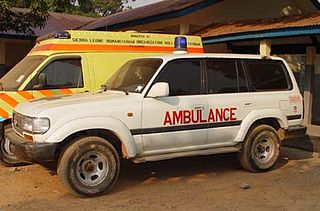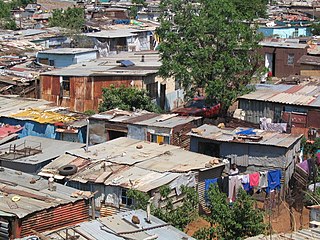
Charles McArthur Ghankay Taylor is a Liberian war criminal and former politician who served as the 22nd President of Liberia from 2 August 1997 until his resignation on 11 August 2003.
Mohamed Kallon, MOR is a Sierra Leonean international manager and former footballer who played as a forward. He is widely considered the most famous footballer from Sierra Leone. He last played for the Sierra Leone club Kallon F.C., as well as making 35 appearances for the Sierra Leone national football team during his career.

The Special Court for Sierra Leone, or the "Special Court" (SCSL), also called the Sierra Leone Tribunal, was a judicial body set up by the government of Sierra Leone and the United Nations to "prosecute persons who bear the greatest responsibility for serious violations of international humanitarian law and Sierra Leonean law" committed in Sierra Leone after 30 November 1996 and during the Sierra Leone Civil War. The court's working language was English. The court listed offices in Freetown, The Hague, and New York City.

Ernest Bai Koroma is a Sierra Leonean politician who served as the 4th President of Sierra Leone from 17 September 2007 to 4 April 2018.

Toni Kroos is a German professional footballer who plays for Spanish club Real Madrid and the German national team. Kroos plays mainly as a central midfielder, but is also used as a defensive midfielder or deep-lying playmaker. He is known for his vision, creativity, passing, and set-piece ability, and is widely considered to be one of the best midfielders in the world.
In terms of available healthcare and health status Sierra Leone is rated very poorly. Globally, infant and maternal mortality rates remain among the highest. The major causes of illness within the country are preventable with modern technology and medical advances. Most deaths within the country are attributed to nutritional deficiencies, lack of access to clean water, pneumonia, diarrheal diseases, anemia, malaria, tuberculosis and HIV/AIDS.
Dr. Christiana Ayoka Mary Thorpe is a former two-term Chief Electoral Commissioner and Chairperson of the National Electoral Commission, an independent agency created by the Sierra Leone government to organise and supervise national, regional and local elections. She is the first woman Chief Electoral Commissioner in the country's history. She was also a Deputy Minister of Education in the 1990s. In March 2016, she was appointed a Deputy Minister of Education, Science and Technology, though one source states that Parliamentary approval was still pending.

The following outline is provided as an overview of and topical guide to Sierra Leone:

Human rights in Sierra Leone are in a rather deplorable state, but have improved gradually since the end of its civil war in 2002. Among the major human-rights problems in Sierra Leone today, according to a 2011 U.S. State Department report, are "security force abuse and use of excessive force with detainees, including juveniles; harsh conditions in prisons and jails; official impunity; arbitrary arrest and detention; prolonged detention, excessive bail, and insufficient legal representation; interference with freedom of speech and press; forcible dispersion of demonstrators; widespread official corruption; societal discrimination and violence against women, discrimination based on sexual orientation; female genital mutilation (FGM); child abuse; trafficking in persons, including children; and forced and child labor".
As of 24 September 2012, a cholera outbreak in Sierra Leone had caused the deaths of 392 people. It was the country's largest outbreak of cholera since first reported in 1970 and the deadliest since the 1994–1995 cholera outbreak. The outbreak has also affected Guinea, which shares a reservoir near the coast. This was the largest cholera outbreak in Africa in 2012.

The most widespread outbreak of Ebola virus disease (EVD) in history began in 2013 and continued until 2016, causing major loss of life and socioeconomic disruption in the West African region, mainly in the countries of Guinea, Liberia, and Sierra Leone. The first cases were recorded in Guinea in December 2013; later, the disease spread to neighboring Liberia and Sierra Leone, with minor outbreaks occurring elsewhere. It caused significant mortality, with the case fatality rate reported at slightly above 70%, while the rate among hospitalized patients was 57–59%. Small outbreaks occurred in Nigeria and Mali, and isolated cases were recorded in Senegal, the United Kingdom and Sardinia. In addition, imported cases led to secondary infection of medical workers in the United States and Spain but did not spread further. The number of cases peaked in October 2014 and then began to decline gradually, following the commitment of substantial international resources. As of 8 May 2016, the World Health Organization (WHO) and respective governments reported a total of 28,616 suspected cases and 11,310 deaths (39.5%), though the WHO believes that this substantially understates the magnitude of the outbreak.

Healthcare in Sierra is generally charged for. and is provided by a mixture of government, private and non-governmental organizations (NGOs). There are over 100 NGOs operating in the health care sector in Sierra Leone. The Ministry of Health and Sanitation is responsible for organizing health care and after the end of the civil war the ministry changed to a decentralized structure of health provision to try to increase its coverage.

An Ebola virus epidemic in Sierra Leone occurred in 2014, along with the neighbouring countries of Guinea and Liberia. On March 18, 2014 Guinean health officials announce the outbreak of a mysterious hemorrhagic fever "which strikes like lightning." It was identified as Ebola virus disease and spread to Sierra Leone by May 2014. The disease is thought to have originated when a child in a bat-hunting family contracted the disease in Guinea in December 2013. Consumption of African bushmeat, including rats, bats, and monkeys, is commonplace in Sierra Leone and West Africa in general.

Organizations from around the world responded to the West African Ebola virus epidemic. In July 2014, the World Health Organization (WHO) convened an emergency meeting with health ministers from eleven countries and announced collaboration on a strategy to co-ordinate technical support to combat the epidemic. In August, they declared the outbreak an international public health emergency and published a roadmap to guide and coordinate the international response to the outbreak, aiming to stop ongoing Ebola transmission worldwide within 6–9 months. In September, the United Nations Security Council declared the Ebola virus outbreak in the West Africa subregion a "threat to international peace and security" and unanimously adopted a resolution urging UN member states to provide more resources to fight the outbreak; the WHO stated that the cost for combating the epidemic will be a minimum of $1 billion.

This article covers the timeline of the 2014 Ebola virus epidemic in West Africa and its outbreaks elsewhere. Flag icons denote the first announcements of confirmed cases by the respective nation-states, their first deaths, and their first secondary transmissions, as well as relevant sessions and announcements of agencies such as the World Health Organization (WHO), the U.S. Centers for Disease Control (CDC), and NGOs such as Doctors Without Borders; medical evacuations, visa restrictions, border closures, quarantines, court rulings, and possible cases of zoonosis are also included.
Polygamy is prohibited under Sierra Leone’s Penal Code. Polygamy is authorised in customary marriages, where a man can take as many wives as he wishes.
The following lists events that happened during 2014 in Sierra Leone.

Ebola virus disease in the United Kingdom, includes an aid worker returning from treating victims of the Ebola virus epidemic in West Africa who contracted the disease.
Victor Kayode Igbekoyi is a Nigerian football player who currently plays for North Carolina FC in the United Soccer League as a midfielder.













